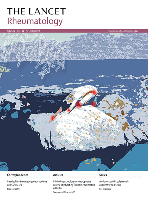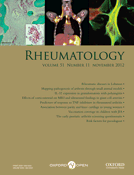
BMC Rheumatology
Scope & Guideline
Unlocking potential through open-access rheumatology research.
Introduction
Aims and Scopes
- Clinical Research on Rheumatic Diseases:
The journal publishes original research on the clinical aspects of rheumatic diseases, including the effectiveness of treatments, disease progression, and patient management strategies. - Epidemiological Studies:
BMC Rheumatology features studies that investigate the prevalence, incidence, and risk factors associated with rheumatic diseases, providing valuable insights into public health implications. - Patient-Centered Research:
Research focusing on patient-reported outcomes, quality of life, and patient experience is prioritized, reflecting the journal's commitment to understanding the patient perspective in rheumatology. - Pharmacological Studies:
The journal includes studies on the efficacy and safety of pharmacological interventions, including biologics and new therapeutic agents, contributing to evidence-based treatment guidelines. - Innovative Research Methodologies:
BMC Rheumatology encourages the use of innovative research methodologies, including qualitative studies, systematic reviews, and meta-analyses, to address complex questions in rheumatology.
Trending and Emerging
- Patient-Reported Outcomes and Quality of Life:
There is an increasing focus on patient-reported outcomes, emphasizing the importance of quality of life and patient satisfaction in the management of rheumatic diseases. - Digital Health and Telemedicine:
The integration of digital health technologies and telemedicine in rheumatology has garnered significant attention, especially following the COVID-19 pandemic, highlighting the need for accessible healthcare solutions. - Multimorbidity and Comorbid Conditions:
Research exploring the impact of comorbidities, such as cardiovascular disease and mental health issues, on rheumatic disease outcomes is emerging as a critical area of study. - Personalized Medicine and Treatment Strategies:
An increasing trend towards personalized medicine approaches, including the use of biomarkers and individualized treatment plans, is evident in recent publications. - Longitudinal and Cohort Studies:
There is a growing emphasis on longitudinal and cohort studies that track disease progression and treatment outcomes over time, providing richer data for analysis and interpretation.
Declining or Waning
- Traditional Biologics Studies:
Research focusing exclusively on traditional biologic therapies appears to be declining as newer therapies and treatment strategies gain attention in the field. - Single-Center Studies:
The prevalence of single-center studies is waning as there is a growing emphasis on multicenter collaborations and larger-scale studies to enhance the generalizability of findings. - Historical and Retrospective Analyses:
While valuable, there is a noticeable decline in studies that solely rely on historical or retrospective analyses, with a preference shifting towards prospective and longitudinal studies. - Basic Science Research:
Research that focuses primarily on basic science aspects of rheumatology, such as cellular and molecular mechanisms, is becoming less common in favor of clinical and translational research. - Epidemiology of Rare Diseases:
Although important, studies specifically targeting rare rheumatic diseases have decreased, possibly due to the challenges in recruitment and the need for broader population studies.
Similar Journals

Lancet Rheumatology
Connecting researchers to transform rheumatological practices.The Lancet Rheumatology, published by Elsevier, is a premier academic journal dedicated to advancing the understanding of rheumatology and immunological diseases. Launched in 2019, this esteemed publication has quickly become a leading source of research, achieving an impressive Q1 ranking in both the fields of Rheumatology and Immunology as of 2023. With Scopus rankings placing it at #2 out of 73 in Medicine - Rheumatology and #6 out of 233 in Medicine - Immunology and Allergy, the journal serves as an essential platform for disseminating high-quality, peer-reviewed articles that address the latest findings and clinical practices in these domains. The journal, accessible in print and online, is committed to fostering knowledge and collaboration among researchers, healthcare professionals, and students alike, making it an invaluable resource for those seeking to deepen their expertise in rheumatology and its interrelated fields.

Pediatric Rheumatology
Transforming pediatric rheumatology with open access knowledge.Pediatric Rheumatology is a leading peer-reviewed open access journal published by BMC, dedicated to disseminating high-quality research in the field of pediatric rheumatology. Since its inception in 2007, the journal has established itself as a vital resource for healthcare professionals, researchers, and students focused on pediatric immunology, rheumatology, and child health, maintaining an impressive Q1 ranking in Pediatrics and Q2 in Immunology and Allergy as well as Rheumatology for 2023. It is recognized for its impact on advancing knowledge and clinical practice, with significant contributions noted in various studies and case reports. With access options that embrace the ethos of open science, all articles published in Pediatric Rheumatology are freely available, promoting collaborative research and discussion among practitioners across the globe. The journal welcomes submissions that encapsulate innovative research, clinical trials, and reviews that address both current challenges and advancements within the pediatric rheumatology landscape.

International Journal of Rheumatic Diseases
Cultivating knowledge for a healthier future.The International Journal of Rheumatic Diseases, published by WILEY, serves as a crucial platform for disseminating high-quality research and advancements in the field of rheumatology. With an ISSN of 1756-1841 and an E-ISSN of 1756-185X, this journal has established itself within the academic community since its inception in 2008, and it is set to continue until at least 2024. Positioned in the Q3 category of rheumatology, the journal holds a significant rank of #38 out of 73 in its field according to Scopus, showcasing its growing influence despite the competitive environment. The absence of Open Access reflects a traditional scholarly publishing model, allowing for meticulous peer-review processes to ensure the rigor and reliability of published studies. This journal aims to foster innovative research, critical reviews, and clinical studies, thereby contributing to a deeper understanding of rheumatic diseases and enhancing patient care. The dedicated readership, including researchers, healthcare professionals, and students, will find valuable insights into the latest findings and methodologies relevant to rheumatology in the journal's comprehensive articles.

Journal of Rheumatic Diseases
Shaping the future of rheumatic disease research together.Journal of Rheumatic Diseases, published by the Korean College of Rheumatology, stands as a pivotal platform in the field of rheumatology, contributing significantly to the advancement of knowledge and clinical practice since its inception. With an impact factor reflecting its esteemed position in the academic community, this open-access journal promotes accessibility to high-quality research, ensuring that groundbreaking discoveries are reachable to all stakeholders in the realm of rheumatic diseases. The journal has maintained its commitment to quality, evidenced by its ranking in the Q3 category for Rheumatology in 2023, and its presence among the top quartiles of medical research. Focusing on innovative therapeutic approaches, emerging diagnostic techniques, and comprehensive reviews, the Journal of Rheumatic Diseases seeks to foster collaboration and dialogue among researchers, clinicians, and students alike. For accessibility, the journal offers numerous articles since its transition to open access in 2017, thereby facilitating research dissemination across the globe. As it converges over the years from 2019 to 2024, the journal promises to be instrumental in shaping the future of rheumatic disease research, inviting contributions that inspire new frontiers in this essential field.

ZEITSCHRIFT FUR RHEUMATOLOGIE
Advancing knowledge in rheumatology since 1974.ZEITSCHRIFT FUR RHEUMATOLOGIE, published by Springer Heidelberg, serves as a vital platform in the field of rheumatology, providing researchers, clinicians, and students with cutting-edge findings and discussions related to the diagnosis, treatment, and management of rheumatic diseases. Since its inception in 1974 and continuing until 2024, this journal retains its commitment to disseminating significant scientific work within this specialized domain. Although it is currently categorized in the Q4 quartile for Rheumatology and ranks 47 out of 73 in Scopus, reflecting its burgeoning presence, the journal is dedicated to evolving and gaining prominence in the academic community. By offering valuable insights and fostering scholarly discourse, ZEITSCHRIFT FUR RHEUMATOLOGIE plays a crucial role in advancing rheumatology research and enhancing patient care practices worldwide. The journal presents an opportunity for its readers to engage with contemporary studies and enrich their understanding of rheumatic ailments.

Current Treatment Options in Rheumatology
Empowering professionals with essential updates in rheumatology.Current Treatment Options in Rheumatology, published by SPRINGERNATURE, is a pivotal journal focused on advancing the field of rheumatology through the dissemination of cutting-edge research and comprehensive reviews. With an emphasis on current therapeutic strategies, this journal aims to provide healthcare professionals, researchers, and students with up-to-date information on the latest treatment modalities for rheumatic diseases. Although it operates under a subscription model, it offers a platform for sharing significant findings that can influence clinical practice and policy within the field of rheumatology. By promoting insightful discussions and collaborations, Current Treatment Options in Rheumatology plays a crucial role in shaping the future of rheumatic disease management and improving patient outcomes.

RHEUMATOLOGY INTERNATIONAL
Connecting global experts in rheumatology and immunology.Rheumatology International, published by Springer Heidelberg, is a prestigious journal that focuses on innovative research in the field of rheumatology and immunology. Established in 1981, this peer-reviewed journal has contributed significantly to advancing our understanding of autoimmune disorders, clinical approaches, and therapeutic interventions. It holds a commendable Q2 ranking in the categories of Immunology, Immunology and Allergy, and Rheumatology as of 2023, showcasing its influence and importance within these disciplines. With a robust Scopus ranking—positioned 14 out of 73 in Medicine Rheumatology—it caters to a diverse audience of researchers, clinicians, and students committed to improving patient care and treatment modalities. Although it does not currently offer open access options, the journal remains a vital resource for insights on contemporary challenges and breakthroughs in rheumatological research, published from its base in Heidelberg, Germany.

RHEUMATOLOGY
Innovating Care Through Groundbreaking Pharmacology InsightsRHEUMATOLOGY, published by Oxford University Press, is a leading journal in the fields of Pharmacology and Rheumatology, recognized for its significant contribution to advancing the understanding and treatment of rheumatic diseases. With an impressive impact factor and ranking within the top quartiles for both medical pharmacology and rheumatology, this journal serves as an essential resource for researchers, clinicians, and healthcare professionals. The journal spans an extensive publication history, with contributions from 1952 to 1995 and from 1998 to 2024, reflecting its enduring commitment to disseminating high-quality research. The Open Access option allows for broader dissemination of knowledge, enhancing the visibility of groundbreaking studies. Positioned in the United Kingdom, RHEUMATOLOGY not only offers valuable insights into the latest therapeutic advancements and clinical guidelines but also fosters collaboration across disciplines, ensuring that practitioners stay at the forefront of innovation in the management of rheumatic conditions.

CLINICAL AND EXPERIMENTAL RHEUMATOLOGY
Elevating research standards in clinical practice.CLINICAL AND EXPERIMENTAL RHEUMATOLOGY is a prestigious journal published by CLINICAL & EXPER RHEUMATOLOGY, dedicated to advancing the field of rheumatology and immunology. With a rich history dating back to 1983, the journal serves as a critical platform for researchers, clinicians, and professionals seeking to disseminate and discuss innovative findings in these rapidly evolving areas. Featuring an impressive Q2 ranking in both Immunology and Allergy, as well as Rheumatology, this journal is recognized for its high-quality contributions, placing it among the top tier of academic publications. Operating without an open access model, CLINICAL AND EXPERIMENTAL RHEUMATOLOGY is headquartered in Pisa, Italy, and publishes articles that undergo rigorous peer review to ensure excellence in research. This journal is an invaluable resource for those dedicated to improving patient outcomes through evidence-based practice in rheumatology, immunology, and related fields.

Rheumatology Advances in Practice
Empowering rheumatology through innovation and education.Rheumatology Advances in Practice, published by Oxford University Press, is a vital open-access journal dedicated to advancing research and education in the field of rheumatology. With an E-ISSN of 2514-1775 and an impressive open access model established since 2017, this journal facilitates the dissemination of cutting-edge knowledge and innovative practices to a global audience. It has garnered recognition within the academic community, holding a Q3 classification in Rheumatology for 2023, which reflects its contribution to the evolving landscape of rheumatological research. The journal aims to present high-quality, peer-reviewed articles that explore the latest findings, advancements, and clinical applications in rheumatology, making it an essential resource for researchers, healthcare professionals, and students alike. By bridging the gap between research and practice, Rheumatology Advances in Practice plays a significant role in improving the care of patients with rheumatological conditions, promoting evidence-based approaches to clinical challenges.